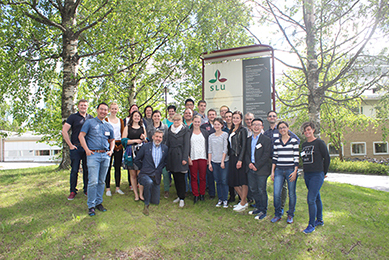 Large-scale methane measurements on individual ruminants for genetic evaluations
Large-scale methane measurements on individual ruminants for genetic evaluations
METHAGENE Training School in Umeå, Sweden.
From June 19-21, 18 trainees were trained in “Breeding for complex traits”. Complex traits are generally traits that are expensive and/or difficult to record on a large scale. Mostly these traits are multi-factorial and many biological processes are lying underneath.
The trainees were first taught on the biology of methane emissions by Pekka Huhtanen from SLU in Umeå. In the afternoon, Eileen Wall (SRUC, Edinburgh, UK) covered all aspects of the selection index theory. In the evening there was an excursion to the fish ladder, with some hopes to see the salmon jump. Unfortunately, we didn’t see the salmon, but the explanation of the fish ladder was very interesting.
On Tuesday morning, Britt Berglund (SLU, Uppsala, Sweden) explained the opportunities for breeding schemes for complex traits. She was followed by Jan Lassen (Viking Genetics, Denmark) by showing the importance for industry to be able to breed for complex traits. What traits are important for the industry, and what do they need from scientists in order to move on?
On the last day the trainees worked on their own breeding programme, incorporating all the aspects they had learned the previous days. The Training School finished with a visit to the experimental farm where many complex traits are recorded.

The presentations of the teachers can be found here (password-protected, for the password please contact Yvette.deHaas@wur.nl):


